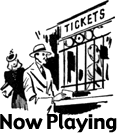
![]()

| This week: |
Filthy says: |
| Every year about this time Hollywood comes out with one of those comedies about two people who have to get home in time for the holidays. You know, the cute, hee-hee flicks with an odd couple on a road trip and encountering all sorts of amusing complications. At a time like this, when the economy is buried under your breakfast remains in the crapper, we're waging a bunch of wars and everybody's blaming everyone else for everything, a movie like that's a welcome diversion. I love something warm, lighthearted, fun and that reminds us how wonderful our lives really are. The Road isn't that movie. I read the capsule synopsis in the paper: "In a post-apocalyptic near future, a boy and his dad must trek across a roiling, desolate landscape while avoiding disease, starvation and enemies to reach the coast and any hope of civilization." Sounded fun enough. Than I saw it was written by Cormac McCarthy and remembered he wrote such other easy summer reads as No Country for Old Men, All the Pretty Horses, Blood Meridien and The Tumbly Puppies Save Easter. I'm not a big reader, but I did glance at the pictures in Puppies at the barbershop a couple weeks ago, so I know this McCarthy guy does some pretty cute shit. Those puppies really were tumbly! They're fucking falling all over each other, out of buckets and garden boots and, one time, out of a cupboard. There are no tumbly puppies in The Road. Not a single Goddamn one. I didn't read the book, so I don't know if director John Hillcoat decided to take them out, or if they aren't in the picture book of The Road. But there are also no tumbly kittens, tumbly ducklings, tumbly piglets, tumbly lambs or tumbly ponies. There's a shitload of cannibals, but they aren't tumbly. They're just mean. Viggo Mortensen plays a father without a name. Kodi Smit-McPhee plays his son without a name. Symbollic, get it? While the world burns and earthquakes turn the soil faster than a farmer on crank, Mortensen takes his boy from their once-idyllic apple-orchard home toward the sea. The ground is scorched, the trees are dead. So are the animals, the bugs and probably 99% of everyone. There is no food except what scraps can be salvaged ten years after everything went to shit. The boy's mother gave up hope a few years back and walked out into the world to be raped and eaten by the savages that will do anything to survive. The rape and flesh-eating aren't in the movie, but if you like that sort of stuff there are a couple German web sites that will sell you 8 mm films. Mortensen doesn't know for sure there will be other non-cannibals at the sea, but he believes it's the most likely place they'd gather. Without that belief, he's got shit. He presses forward, through a dreary, bleak, polluted, dead world. Like walking to school in Gary, Indiana. This is the central theme of The Road: whether to give up or not. How much hope should you have left before you give up? For a lot of us, the idea of walking a few hundred miles through lands roamed by cannibal rapists just on faith sounds like a pain in the ass. Nah, better to take a bullet to the head in the comfort of your own home than make an effort to reach a goal that may or may not exist. Mortensen keeps going in the face of adversity. Not unlike a tumbly puppy. It has nothing to do with himself. After all, he's dying. Instead, he keeps pushing because he wants there to be something at the sea for Smit-McPhee. That's a quaint notion: that a father would make the ultimate sacrifice just because he can't bring himself to give up on even the slightest sliver of hope for his son. Cute and all, but not the way we do it here in Arvada. Hell, folks around here don't even vaccinate their kids because it's too big a fucking hassle to load 'em in the car, and a former Playboy Playmate said it's okay to stay home and watch NASCAR instead. Or give the little brats vegetables because McDonald's already prepared a meal that'll shut them up for a few hours. On their bleak slog through the oppressively sunless and gray countryside, Mortensen and Smit-McPhee must do only with what they can scavenge, and with a pistol containing two shells. Mortensen can use the two shells on himself and his son any time he chooses, but does not. He pushes forward toward the sea and through roving bands of cannibals. First is a group traveling on the only mechanized vehicle in the movie. Then, they enter a house and find a basement full of fresh meat and must hide when the cannibal occupants return. Later, they duck to hide as more cannibals butcher two young women in a field. Their lone delights are discovering a can of Coke in a beat old vending machine, and uncovering a well-stocked bomb shelter where they gorge themselves on Cheetos and canned pineapple for a night. Another theme of The Road is the constant balance of social good versus personal good. It's pretty fucking good for you personally to punch your neighbors in the face, but it's not so great for society as a whole. It's pretty good for you personally to cut other people off and get to an intersection first, but your assholish quest to save five seconds cost the other drivers a cumulative 20 seconds plus stress. The social and personal good don't always mesh. That's where ethics come in. Should, anyway. As far as I can tell, when I see two people fighting over a Broncos throw rug at the Family Dollar, I realize there is very little thought about social good. In The Road this moral question comes up in the way Mortensen must choose between long-term survival for his and Smit-McPhee and near-term survival for a larger group. When they fid a cache of food, the boy wants to share. This will shorten how long the food lasts for he and Mortensen, but it will make others more comfortable for a little while. I don't know the right answer, and I suppose it relies a lot on whether there is a reason to survive. The Road brings up a couple of interesting moral concepts. The problem with it, though, is that it is so fucking bleak for so fucking long. Actually, I don't mind relentlessly bleak. I live in Arvada, after all. What bores me is relentlessly monotonous. There are only so many times that Mortensen and Smit-McPhee can narrowly escape from cannibals before the scenes become repetitious. Likewise, seeing them starve gets old and stops adding new dimension pretty early into the movie. Mortensen and Smit-McPhee are filthy and tired. They are skinny and nearly numb. The boy is scared. Director Hillcoat effectively makes this clear, and gives us what feels like a decent facsimile of the world's future if it were controlled by Uzbeks for a few years. Then, he keeps repeating it. It's bleak, it's powerful, it's boring as hell. This is exactly why the tumbly puppies tumble. If that picture book had solely been about the part where they live in constant terror of the dog-eating old woman who has locked them in a tiny, shit-stained cage it would have gotten tiresome quickly. Three Fingers for The Road. It's got some interesting thoughts, but it's not as interesting to watch as it is to think about. Next time someone adapts a McCarthy novel, I hope they choose something with talking animals. |
 |
|
Pete Hammond of Boxoffice Magazine Brothers is "Absolutely mesmerizing! An Oscar-worthy must-see movie for our times!" Oh, Pete, you're slipping. You missed the trifecta by forgetting to mention is it either "edge-of-your seat" or "laugh-out-loud". |
|
Listening
to |





